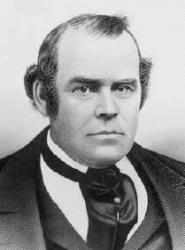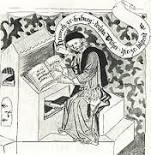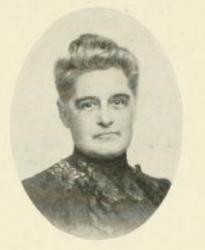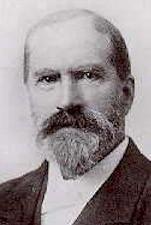Planning worship?
Check out our sister site, ZeteoSearch.org,
for 20+ additional resources related to your search.
- |
User Links
Person Results
Samuel Johnson

1822 - 1882 Person Name: Rev. Samuel Johnson Topics: The Church and the Sacraments The Church Author of "City of God, how broad and far" in The Hymnal Johnson, Samuel, M.A, was born at Salem, Massachusetts, Oct. 10, 1822, and educated at Harvard, where he graduated in Arts in 1842, and in Theology in 1846. In 1853 he formed a Free Church in Lynn, Massachusetts, and remained its pastor to 1870. Although never directly connected with any religious denomination, he was mainly associated in the public mind with the Unitarians. He was joint editor with S. Longfellow (q. v.) of A Book of Hymns for Public and Private Devotion, Boston, 1846; the Supplement to the same, 1848; and Hymns of the Spirit, 1864. His contributions to these collections were less numerous than those by S. Longfellow, but not less meritorious. He died at North Andover, Massachusetts, Feb. 19, 1882. His hymns were thus contributed:—
i. To A Book of Hymns, 1846.
1. Father [Saviour] in Thy mysterious presence kneeling. Divine Worship.
2. Go, preach the gospel in my name. Ordination.
3. Lord, once our faith in man no fear could move. In Time of War.
4. O God, Thy children gathered here. Ordination.
5. Onward, Christians, [onward] through the region. Conflict. In the Hymns of the Spirit, 1864, it was altered to "Onward, onward through the region."
6. Thy servants' sandals, Lord, are wet. Ordination.
7. When from Jordan's gleaming wave. Holy Baptism.
ii. To the Supplement, 1848.
8. God of the earnest heart. Trust.
iii. To the Hymns of the Spirit, 1864.
9. City of God, how broad, how far. The Church the City of God.
10. I bless Thee, Lord, for sorrows sent. Affliction— Perfect through suffering.
11. Life of Ages, richly poured. Inspiration.
12. Strong-souled Reformer, Whose far-seeing faith. Power of Jesus.
13. The Will Divine that woke a waiting time. St. Paul.
14. Thou Whose glad summer yields. Prayer for the Church.
15. To light that shines in stars and souls. Dedication of a Place of Worship.
Of these hymns No. 8 was "Written for the Graduating Exercises of the Class of 1846; in Cambridge Divinity Schools ; and No. 10 “Written at the request of Dorothea L. Dix for a collection made by her for the use of an asylum." It is undated. A few only of these hymns are in use in Great Britain. [Rev. F. M. Bird, M.A.]
-- John Julian, Dictionary of Hymnology (1907)
Samuel Johnson
Robert Campbell
1814 - 1868 Person Name: Robert Campbell, 1814 - 68 Topics: The Church Year Easter; Sacraments and Rites Holy Communion Translator of "At the Lamb's high feast we sing" in Service Book and Hymnal of the Lutheran Church in America Robert Campbell was an advocate residing in Edinburgh. He is not much known as an author, but some of his hymns have been adopted in several hymnals. He was Roman Catholic. His death occurred in 1868.
--Annotations of the Hymnal, Charles Hutchins, M.A. 1872.
====================
Campbell, Robert. Advocate, of Sherrington, Scotland, was born at Trochmig, Ayrshire, Dec. 19, 1814. When quite a boy he attended the University of Glasgow. Though showing from his earliest years a strong predilection for Theological studies, eventually he fixed upon the Scottish law as a profession. To this end he entered the Law Classes of the University of Edinburgh, and in due course entered upon the duties of an advocate. Originally a Presbyterian, at an early age he joined the Episcopal Church of Scotland. He became a zealous and devoted Churchman, directing his special attention to the education of the children of the poor. His classical attainments were good, and his general reading extensive. In 1848 he began a series of translations of Latin hymns. These he submitted to Dr. Neale, Dr. Mills of Ely, and other competent judges. In 1850, a selection therefrom, together with a few of his original hymns, and a limited number from other writers, was published as Hymns and Anthems for Use in the Holy Services of the Church within the United Diocese of St. Andrews, Dunkeld, and Dunblane. Edinburgh, R. Lendrum & Co.
This collection, known as the St. Andrews Hymnal, received the special sanction of Bishop Torry, and was used throughout the Diocese for some years. Two years after its publication he joined the Roman Catholic Church. During the next sixteen years he devoted much time to the young and poor. He died at Edinburgh, Dec. 29, 1868.
From his collection of 1850, four translations were given in Hymns Ancient & Modern, 1861, "At the Lamb's high feast we sing;" “Come, pure hearts, in sweetest measures;" "Ye Choirs of New Jerusalem;" " Ye servants of a martyr'd God" (altered). Attention was thereby directed to his translations. They are smooth, musical, and well sustained. A large number, not included in his 1850 collection, were left by him in manuscript. From these Mr. O.Shipley has printed several in his Annus Sanctus, 1884. (C. MSS.)
--John Julian, Dictionary of Hymnology (1907)
Robert Campbell
Alexander Pope

1688 - 1744 Topics: The Church and the Sacraments Christian Fellowship Author of "Rise, crowned with light, imperial Salem, rise!" in The Hymnal Alexander Pope was born in London, in 1688. His parents were Roman Catholics. He had a feeble constitution, was deformed in person, and attained the age of only fifty-six. He early acquired the means of independence by his literary gifts, and purchased his celebrated villa at Twickenham, whither he went to reside at the age of thirty. Of his many published works, his translation of the "Iliad" and "Odyssey" of Homer has given him the greatest reputation. As an English satirist, also, he stands very high. Nearly all his works, however, are imitations. He died at Tickenham, in 1744.
--Annotations of the Hymnal, Charles Hutchins, M.A., 1872
========
Pope, Alexander, the poet, son of a wholesale linen merchant in Lombard Street, London, was born in Plough Court, Lombard Street, May 21, 1688. His father being a Roman Catholic, he was first placed under the charge of Father Taverner, who taught him the rudiments of Greek and Latin. Later he attended a school at Winchester, and then at Hyde Park Corner. When about twelve he retired with his parents to Binfield, in Windsor Forest, and from thenceforth his education was mainly in his own hands. His subsequent success as a writer and poet is a matter of history, and has been dealt with in detail by Dr. Johnson in his Lives of the Poets, and by others. He died May 30, 1744, and was buried in a vault in Twickenham Church. For distinct public use, so far as we are aware, Pope wrote no hymns. His "Messiah"; his "Universal Prayer"; and his "Vital Spark" (q.v.), have been made use of for congregational purposes, but as a Roman Catholic he had no object in writing a hymn in a language which, at that time, his Church would refuse to use. In modern hymn-books his name is identified with the following pieces:--
1. Father of all, in every age. Universal Prayer. The Lord's Prayer. This Prayer was published in 1738, as a conclusion to his Essay on Man, in 13 st. of 4 1. Warburton in his Advertisement of the 1748 ed. of the Essay, says:—
"Concerning the Universal Prayer which concludes the Essay, it may be proper to observe that some pas¬sages in the Essay having been unjustly suspected of a tendency towards Fate and Naturalism, the author composed that Prayer as the sum of all, to show that hi a system was founded in Freewill, and terminated in Piety: that the First Cause was as well the Lord and Governor as the Creator of the Universe; and that by submission to His will (the great principle enforced throughout the Essay) was not meant the suffering ourselves to be carried along with a blind determination; but a religious acquiescence, and confidence full of hope and immortality. To give all this the greater weight and reality, the Poet chose for his model The Lord's Prayer, which of all others best deserves the title prefixed to his Paraphrase."
The title here referred to is "The Universal Prayer, Deo Opt. Max." The hymn is found in common use in the following forms:—
(1.) Father of all in every age. This is an abbreviated form, and has been in use, especially in Unitarian hymnbooks, from an early date.
(2.) Father of all, [and] Thou God of love. This cento was given in 6 st. of 4 1. in the 1815 edition of Cotterill's Selections, No. 2; again in the 1819 ed., 141; in Stowell's Psalms & Hymns, 1831, No. 179; and again in later collections.
(3.) Not to this earth's contracted span. In Collyer's Collection 1812, No. 629, in 4 st. of 4 1., and others.
(4.) Teach me to feel another's woe. Also in Collyer's Collection, 1812, No. 630, in 4 st. of 4 1., and others.
(5.) Thou Great First Cause, least understood. Also in Collyer's Collection, 1812, No. 628, in 4 st. of 4 1., and later hymnals.
(6.) When I am right Thy grace impart. Given in Kennedy, 1863, No. 1166.
2. Ye nymphs of Solyma! begin the song. The Messiah. In No. 378 of the Spectator for Wednesday, May 14, 1712, Addison gave this poem with the introduction :—
"I will make no apology for entertaining the reader with the following poem, which is written by a great genius, a friend of mine, in the country, who is not ashamed to employ his wit in the praise of his Maker."
Then follows the poem with the heading, “Messiah. A Sacred Eclogue, composed of several passages of Isaiah the Prophet. Written in imitation of Virgil's Pollio." It consists of 107 lines. When republished by Pope this heading was expanded into a paragraph as an "Advertisement." As a poem it is unknown to the hymn-book; but from it the following centos have passed into common use:--
(1.) As the Good Shepherd tends his fleecy care. This was given in Collyer's Collection, 1812, No. 626, in 6 st. of 4 1., and has been repeated in later hymnals, but usually in an abridged form.
(2.) From Jesse's root, behold a branch arise No. 624 in Collyer's Collection, 1812, in 5 st. of 4 1.; and again in later hymnals.
(3.) Hark! a glad voice the lonely desert cheers. No. 625 in Collyer's Collection, 1812, in 4 st. of 4 1.; in Bishop Heber's posthumous Hymns, &c, 1827, p. 106; and again in later collections.
(4.) Rise crowned with light, imperial Salem rise. In the Leeds Hymn Book, 1853, No. 687, in 3 st. of 8 1., and several later collections.
(5.) The Saviour comes! by ancient seers foretold. In Mercer's Church Psalm & Hymn Book, 1864, and others.
It may be noted that 1. 46 of The Messiah reads in the original "He wipes the tears for ever from our eyes." This was altered by Pope at the suggestion of Steele, made to Pope in a letter dated June 1, 1712, to "From every face He wipes off every tear." This latter is the poet's authorized reading, is given in his Works, and is found also in the book form reprints of the Spectator.
-- John Julian, Dictionary of Hymnology (1907)
Alexander Pope
Arthur Sullivan

1842 - 1900 Person Name: Arthur S. Sullivan, 1842-1900 Topics: The Church and The Sacraments Blessing Composer of "LIVORNO" in The Hymnal Arthur Seymour Sullivan (b Lambeth, London. England. 1842; d. Westminster, London, 1900) was born of an Italian mother and an Irish father who was an army bandmaster and a professor of music. Sullivan entered the Chapel Royal as a chorister in 1854. He was elected as the first Mendelssohn scholar in 1856, when he began his studies at the Royal Academy of Music in London. He also studied at the Leipzig Conservatory (1858-1861) and in 1866 was appointed professor of composition at the Royal Academy of Music. Early in his career Sullivan composed oratorios and music for some Shakespeare plays. However, he is best known for writing the music for lyrics by William S. Gilbert, which produced popular operettas such as H.M.S. Pinafore (1878), The Pirates of Penzance (1879), The Mikado (1884), and Yeomen of the Guard (1888). These operettas satirized the court and everyday life in Victorian times. Although he composed some anthems, in the area of church music Sullivan is best remembered for his hymn tunes, written between 1867 and 1874 and published in The Hymnary (1872) and Church Hymns (1874), both of which he edited. He contributed hymns to A Hymnal Chiefly from The Book of Praise (1867) and to the Presbyterian collection Psalms and Hymns for Divine Worship (1867). A complete collection of his hymns and arrangements was published posthumously as Hymn Tunes by Arthur Sullivan (1902). Sullivan steadfastly refused to grant permission to those who wished to make hymn tunes from the popular melodies in his operettas.
Bert Polman
Arthur Sullivan
Parley Parker Pratt

1807 - 1857 Person Name: P. P. Pratt, 1807-1857 Topics: The Church and The Sacraments Revelation and Restoration Author of "The morning breaks, the shadows flee" in The Hymnal
Parley Parker Pratt
Arthur Cottman
1842 - 1879 Topics: The Church and the Sacraments The Church Composer of "MIRFIELD" in The Hymnal Born: Circa November 1841, Ringwood, Hampshire, England.
Died: Circa May 1879, Brentford, Middlesex, England.
Cottman was a solicitor and amateur musician. His works include:
Ten Original Tunes, 1874
Music:
CATERHAM
COTTMAN
DALEHURST
EVERSLEY
MIRFIELD
MORN OF GLADNESS
--www.hymntime.com/tch
Arthur Cottman
Heinrich von Laufenberg

1390 - 1460 Topics: The Church and The Sacraments Blessing Author of "O holy Jesus, Lord divine" in The Hymnal Heinrich of Laufenburg was a native of Laufenburg, Aargau, Switzerland, The earliest notice of him is that in 1434 he was decan of the Collegiate Church of St. Maurice at Zofingen in Aargau. He afterwards held a similar post at Freiburg, in Baden; but in 1445 became a monk in the monastery of the Knights of St. John at Strassburg ("Zum grunen Werde"). He was living there in 1458, but probably died in that year or soon after (Koch, i. 213-214; Allgemine Deutsche Biographie, xix. 810-813, &c).
He was the most important and most prolific hymn-writer of the 15th century, and a number of his productions are of sweetness and abiding worth. Most of them are in honour of the Blessed Virgin Mary. Many are in intricate metres, while others are written to song tunes, or are recasts of songs, or translations from the Latin. A large number are included by Wackernagel in his second volume, principally taken from a paper manuscript of the 15th century, which he found in the town library at Strassburg.
Two of the best of his original hymns are:—
i. Ach lieber Herre Jesu Christ. Cradle Hymn. This beautiful prayer of a mother for her infant child is given by Wackernagel, ii. p. 534, in 5 stanza of 6 lines, from the Strassburg MS., where it is entitled "Benedictio puerily." In his Kleines Gesang-Buch, 1860, Wackernagel gives it as No. 114 (omitting stanza ii.) with the original melody, dating both 1429. The text is also in Hoffmann von Fallersleben, edition 1861, No. 125. Translated as:—
Ah ! Jesu Christ, my Lord most dear. A full and very good translation by Miss Winkworth in her ChristianSingers, &c, 1869, p. 93. The address to the B. V. M. in stanza ii.,
"Maria, müter Jesu Christ,
Sit du dins Kints gewaltig bist,"
is translated as:—
“Since in Thy heavenly kingdom, Lord,
All things obey Thy lightest word."
Her translation was adopted with alterations by the Rev. H. White in the Savoy Hymnary (Chapel Royal, Savoy), 1870, No. 35, beginning, "Lord Jesu Christ, our Lord most dear." Instead of taking the very good original melody, Mr. White altered the hymn to 6-8 metre, and omitted stanzas iv., v. This form has been repeated in the S. P. C. K. Church Hymns, 1871; Mrs. Brock's Children's Hymn Book, 1881, and others.
ii. Ich wollt dass ich daheime war. Eternal Life. A beautiful hymn of spiritual Home¬sickness. Wackernagel, ii. p. 540, includes a version in 13 stanzas of 2 lines from the Strassburg MS.; and another in 9 stanzas of 2 lines from a 15th century MS. at Berlin. Hoffmann von Fallersleben, 1861, gives the Strassburg text as No. 54; and a form in 9 stanzas from a MS. at Inzkofen, near Sigmaringen, dating 1470-1480, as No. 55. In his Kleines Gesang-Buch,1860, Wackernagel gives as No. 74 a slightly altered form of the Strassburg text, along with the original melody. Translated as "I would I were at last at home," by Miss Winkworth, 1869, p. 92. [Rev. James Mearns, M.A.]
-- John Julian, Dictionary of Hymnology
Heinrich von Laufenberg
May P. Hoyt

1849 - 1923 Topics: The Church and The Sacraments Lord's Supper Author of "Here at thy table, Lord" in The Hymnal May (Mary) Pierpont Hoyt, born 1849 in South Avon, N.Y., daughter of Uriah Grandison Hoyt and Emma G. Pierpont. Her mother died in 1856 when she was 7 years old. She attended Oread Collegiate Institute in Worcester, Mass., a school for women, from 1862-1863. She then returned to Rochester, N.Y. and attended Livingston Park Seminary, another school for women. She graduated from Livingston and taught there for two years, and then taught for two years in the public schools. She later moved to Albany, living with a friend for twenty years until the friend remarried. she then lived at the Albany Hospital. She claims to have written two hymns appearing in "Church Hymnary" (edited by Edwin A. Bedell, published in 1900 by Maynard, Merrill & Co.) Nos. 736 and 985. #736 is "Here at Thy table, Lord" and #985 is "Though life be long and life be sad." She died in November 11, 1923 in Albany and was buried at Mount Hope Cemetery in Rochester, N.Y.
Dianne Shapiro, from History of the Oread Collegiate Institute, Worcester, Mass. (1849-1881): with biographical sketches" by Martha Burt Wright and Anne M. Bancroft (New Haven, Conn.: Tuttle, Morehouse & Taylor Co., 1905; Ancestry.com record for Uriah Grandison Hoyt, 1824-1901; and Find A Grave Memorial website (both accessed 3/19/2021)
===================
Hoyt, May Pierpont (late 19th century?). Disciple (?). Nothing is known of this writer except what can be inferred from the appearance of one hymn credited to this name, "Here at thy table, Lord, This sacred hour," a communion hymn written in the meter of, and printed with the tune of, "Break thou the bread of life," and apparently intended to supplant Lathbury's 1877 Bible hymn often used as if it were referring to the bread of the Lord's Supper. "Here at thy table" has been reported as early as 1889, and it has appeared quite generally in Disciple books since as early as 1905, but seldom in books of other denominations. --George Brandon, DNAH Archives
May P. Hoyt
H. D. Rawnsley

1851 - 1920 Person Name: Hardwicke Drummond Rawnsley, 1851-1920 Topics: The Church and The Sacraments Health and Healing Author of "O God whose will is life and good" in The Hymnal Rawnsley, Hardwicke Drummond, M.A., son of the Rev. R. D. B. Rawnsley, M.A., sometime Prebendary of Lincoln, was born at Shiplake-on-Thames, Sept. 28,1850, and educated at Ball. Coll., Oxford, B.A. 1875, M.A. 1883; D. 1875, P. 1877; Curate of St. Barnabas, Bristol, 1875-77; Vicar of Low Wray, Lancashire, 1878-83, and Vicar of Crosthwaite since 1883. He became Rural Dean of Keswick 1883, Hon. Canon of Carlisle 1893, and Proctor in Convocation 1905. His publications include: Notes for the Nile, 1892; Literary Associations of the English Lakes, 1894; Memoir of Harvey Goodwin, Bishop of Carlisle, 1896; Sermons on the Logia, 1897, and various books of Poems and Sonnets. The best-known of his hymns are:—
1. Hark! I hear the trumpet sounding. [Mission Hymn for Children.] In the Ch. Missionary Hymn Book, 1899.
2. Lord God, our praise we give. [In Praise of Nature]. Contributed to the 1904 ed. of Hymns Ancient & Modern.
3. Now trumpets cease your sound. [Peace.] In Hymns of the Kingdom . . . for the use of the Christian Democracy. Norwich, 1903.
4. Saviour, Who didst healing give. [St. Luke.] Written at Crosthwaite Vicarage, Dec. 1, 1905, and included in The English Hymnal 1906.
5. Lord Jesu, Who at Lazarus' tomb. [Memorial of the Dead.] Written at Crosthwaite Vicarage, Dec. 2, 1905, for The English Hymnal, 1906.
6. Lord, Who gavest streams and fountains. [For a Dual School.] Written in 1898 at Keswick for the Holiday Association of the Home Readers' Union, and included in the Keswick School Hymn Book.
--John Julian, Dictionary of Hymnology, New Supplement (1907)
H. D. Rawnsley
A. L. Peace

1844 - 1912 Person Name: Albert Peace, 1844-1912 Topics: The Church and The Sacraments Health and Healing Composer of "ST. MARGARET" in The Hymnal Albert Lister Peace DMus United Kingdom 1844-1912. Born at Huddersfield, Yorkshire, England, son of a warehouseman and woolstapler, he was extremely gifted as a musician, largely self-taught, playing the organ at Holmfirth Parish Church near Huddersfield at age nine. He married Margaret Martin Steel Gilchrist, and they had three children: Lister, Archibald, and Margaret. In 1865 he was appointed organist of Trinity Congregational Church in Glasgow, Scotland. He obtained his doctorate degree from the University of Oxford in 1875. He became organist at Glasgow Cathedral in 1879. In 1897 he succeeded William Best as organist at St George’s Hall, Liverpool. In later years he was in much demand to play the organ in recitals. He did so at Canterbury Cathedral (1886), Victoria Hall, Hanley, Stoke-on-Trent (1888), and Newcastle Cathedral (1891). He composed orchestrations, sonatas, cantatas, and concert and church service anthems. He was an arranger, author, and editor. He died at Blundelsands, Liverpool, England.
John Perry
A. L. Peace


 My Starred Hymns
My Starred Hymns


